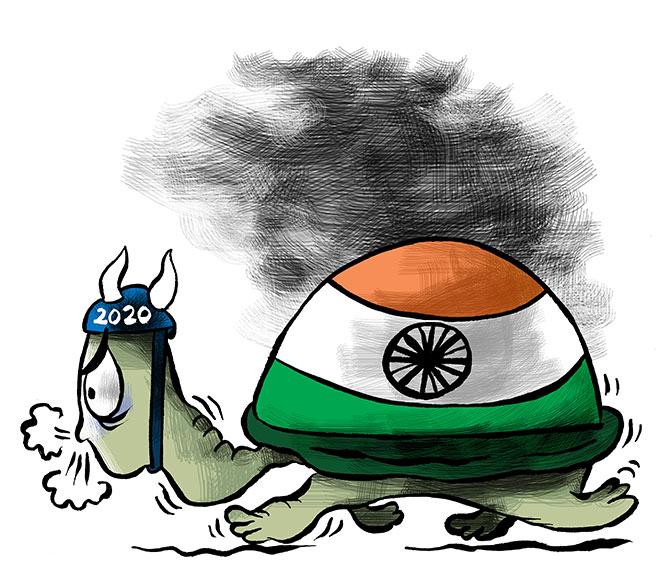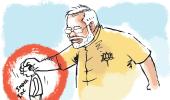'It may sound like sacrilege, but does it really matter if the global raters downgrade India for fiscal slippage?' asks Tamal Bandyopadhyay.

Two off-cycle rate cuts by the Reserve Bank of India and a Rs 20 trillion plus package by the government. Are they enough to fight the impact of COVID-19?
While the central bank is willing to do anything to bring back the growth impulse in Asia's third-largest economy, the government does not want to waste this crisis. It is pushing for reforms.
In many ways, India's fight against the global pandemic is very different from that in the rest of the world.
The fiscal stimulus that has been unleashed by most nations is in the range of mid to high single digit as a percentage of GDP; the global average is close to 4 per cent.
The fiscal stimulus in the Rs 20 trillion package is just around 1 per cent.
Of course, the impact on fiscal deficit is far higher because of the drop in revenue generation.
At this point, the analyst community is writing about 6 per cent fiscal deficit against the budgeted 3.5 per cent.
For the states, it is 4 per cent against the estimated 2.5 per cent.
The combined fiscal deficit of the Centre and the state governments could be 10 per cent against an estimated 6 per cent. Even this could be a conservative figure.
Against this backdrop, it is a tightrope walk for the government.
We have just completed the second month of the new financial year.
Isn't that too early to be too liberal when it comes to spending by the government?
This is the conventional argument. Since everybody, including the RBI, is convinced that negative growth is staring at the economy, is it time for revival or survival?
Going beyond semantics, stimulus is the priority at this hour; reforms can accompany it but not replace it.
Globally, two important ingredients of all the economic packages to fight COVID-19 are lending and spending.
In India, the central bank has cut its policy rate twice and pared the 'effective' rate from 5.15 per cent to 3.35 per cent, its lowest, and opened many windows to infuse liquidity into the system.
Banks have enough money in their kitty, but they lack the appetite for credit risks.
The government guarantee will encourage them to take the plunge.
The Cabinet approval for a Rs 30,000 crore support to the non-banking financial companies (NBFCs) through a special purpose vehicle (SPV) is a good example of what can be done to push lending.
The RBI will buy the NBFC papers from the SPV for 90 days. This is too short a time.
While the central bank is likely to keep on rolling over its exposure (the RBI Act caps the maturity of such transactions at 90 days), this is also too small an amount.
The need of the hour is big dollops of government-guaranteed loans through innovative mechanisms for many segments of the industry.
Two more things to watch out for in the lending space is recapitalisation of some of the public sector banks and a one-time restructuring of loans that will turn bad in the current crisis.
The government has not budgeted for capital support to the public sector banking industry in the current financial year but, for aggressive lending, they will need capital.
One of the reasons why they are not too excited to lend is the lack of capital.
As the bad loan pile rises, they will have to provide for such loans and that will further erode their capital.
The government has allowed a one-year holiday from insolvency proceedings for bank defaulters but the RBI has kept its cards close to its chest.
Banks’ bad loans will swell this year. Unless they are given a window for one-time restructuring of bad loans, their balance sheets will crumble.
Bank lending needs to be supported by government spending -- the fiscal stimulus.
The conservatism on spending comes from the fear of being downgraded by global rating agencies if the fiscal deficit shoots up.
In November 2017, Moody's Investors Service upgraded India's sovereign bond rating for the first time in 14 years, endorsing the structural reforms undertaken by the Modi government which the rater felt would boost growth and reduce the debt burden.
It raised the rating to the lowest investment grade Baa2 from Baa3 and changed its rating outlook to stable from positive, finding risks to India's credit profile broadly balanced.
Two years on, Moody's lowered the outlook on India's rating to negative from stable, citing a prolonged economic slowdown, worsening the shadow banking crunch and rising public debt, among other concerns, even as S&P Global reaffirmed its rating for India at BBB- with stable outlook.
Recently, Fitch Ratings warned that the deterioration in India's fiscal outlook as a result of lower growth could put pressure on its sovereign rating.
It may sound like sacrilege, but does it really matter if the global raters downgrade India for fiscal slippage?
The sovereign does not borrow overseas; a few Indian corporations that raise money offshore will have to pay a higher cost if a downgrade happens. but not too many of them may go for money raising right now as they are not investing.
All investments are done by the government and it raises money from the domestic market.
Along with lending and spending, we also need bending: The government needs to bend the rules and go for higher stimulus at the risk of fiscal slippage.
It's a classic Hobson's choice: Spend now and take the risk of being downgraded as spending will bring back the economy on the growth path much faster.
So, even if the downgrade happens, the growth will put pressure on the raters to upgrade India again.
If it does not spend to keep the fiscal deficit relatively low, can India avoid downgrade? Not really.
When other emerging markets are banking big on fiscal stimulus and hoping to come back on the growth path sooner than later, India will struggle to see growth and run the risk of being downgraded.
In the second scenario, the next upgrade of rating will take a while.
Meanwhile, overseas investors might leave Indian shore for greener pastures.
Tamal Bandyopadhyay, a consulting editor with Business Standard, is an author and senior adviser to Jana Small Finance Bank Ltd.











